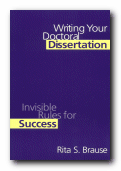guide to advanced academic study and writing skills
Do people at doctoral dissertation level need writing guides? Well yes, they do, because a composition of this scope usually presents difficulties most of us have never come across before. After all, we don’t produce 50,000 word research projects just for fun, do we? Rita Brause starts by explaining the differences between a dissertation and a long term paper [UK=coursework essay]. These are important distinctions which are often learned by most students only at the expense of much anguish and re-writing.
 She also stresses just how much anybody will learn during the process of writing a dissertation, which is the sort of insight unlikely to be available to someone approaching this experience for the first time. She analyses practical examples to show the important structural elements of a dissertation, and then goes on to explain the stages in the doctoral process – including making an application, learning the language of institutions, and fulfilling all their technical requirements. These elements need to be taken into account even before the writing begins, and she justifies the attention she gives to them quite convincingly on the grounds that many students who fail to complete their research do so because they had no idea what to expect when they started out.
She also stresses just how much anybody will learn during the process of writing a dissertation, which is the sort of insight unlikely to be available to someone approaching this experience for the first time. She analyses practical examples to show the important structural elements of a dissertation, and then goes on to explain the stages in the doctoral process – including making an application, learning the language of institutions, and fulfilling all their technical requirements. These elements need to be taken into account even before the writing begins, and she justifies the attention she gives to them quite convincingly on the grounds that many students who fail to complete their research do so because they had no idea what to expect when they started out.
It is the US system she is describing, which contains the element of working to a committee that is not found in the UK system, but when it comes to the business of writing, all the issues of preparation, organisation, and intellectual stamina are identical.
The heart of the book comes three-quarters way through, where she describes in detail the process of locating and defining a topic, as well as the type of questions you should ask in order to ‘refine’ a topic or turn an observation into a proposal. These are the stages which in my experience of post-graduate teaching cause students most problems. A research proposal which has not been clearly defined is like an intellectual quagmire. No matter how much new material is generated, the student will be sucked ever deeper into the morass by competing priorities and a lack of focus.
There are three short bibliographies on dissertations, the academic world, and research methodology; but what I think might appeal most of all to the intended audience of this writing guide is an interesting collection of tips (some quite daunting) from former doctoral candidates. There’s often nothing quite so convincing as the reports of first-hand experience.
© Roy Johnson 2005
Rita S. Brause, Writing your Doctoral Dissertation: Invisible Rules for Success, London: Falmer Press, 2000, pp.163, ISBN: 0750707445
More on study skills
More on writing skills
More on online learning